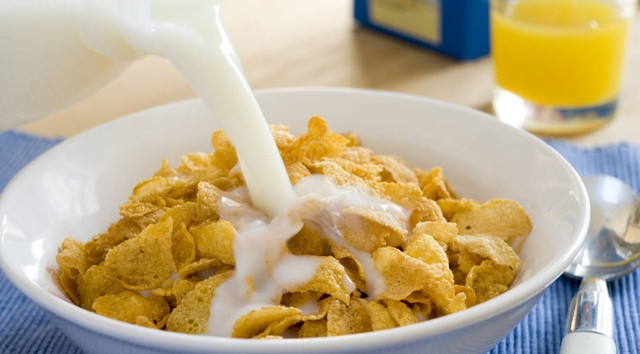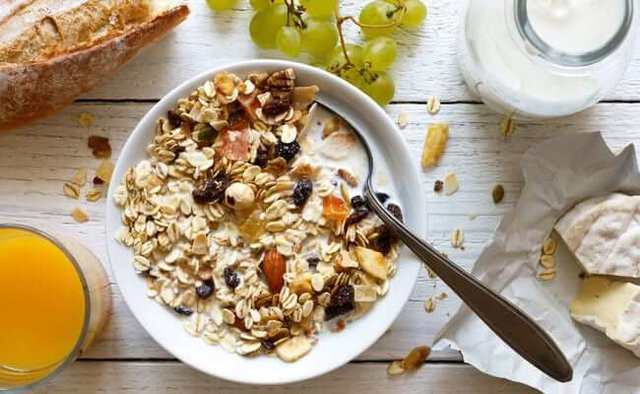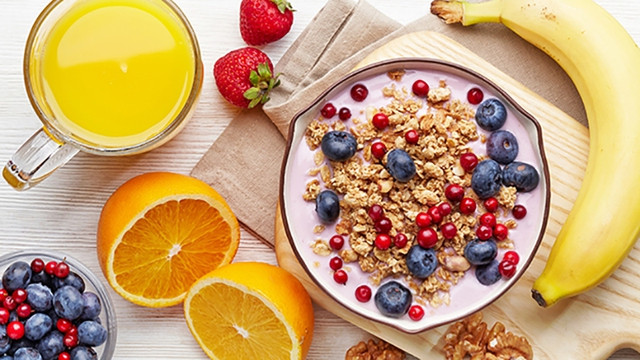5 tips for eating healthy breakfast cereals
Cereal is a quick, convenient and delicious breakfast option. However, is it nutritious and how to eat it to be healthy?
1. Breakfast cereal, convenient but nutritious?
Breakfast cereals come in a wide variety of products, they can be made from whole grains or processed grains, with or without added vitamins and minerals and other ingredients such as nuts, seeds and dried fruit.
So are breakfast cereals healthy? The answer lies in what ingredients the cereal contains.
Specifically, most processed cereals are usually made from refined grains. Refined grains are grains that have been refined and have had the outer bran and germ removed. These grains are processed and have additives and flavorings added to enrich the flavor.
They often go through refining, blending, pressing, drying, shaping and even using dyes and sweeteners to make them more attractive and delicious but no longer have natural ingredients such as bran, fiber, vitamins.
 |
Refined grains are often lacking in fiber and vitamins. |
Instant cereals are essentially fast food that is high in carbohydrates, high in sugar, and low or no fiber. These breakfast cereals are often really unhealthy and nutritionally unbalanced, even if they are fortified with vitamins and minerals.
However, there are some healthy breakfast cereals that use whole grains that retain their natural fiber, protein, vitamins and minerals. Although it can be whole grain or ground into smaller pieces as long as it uses whole grains, there can be little or no added sugar or dried fruit.
While refined grains are bad, whole grains have many health benefits. Whole grains are rich in B vitamins and antioxidants, which help protect cells from damage. Because they are not processed, they are high in fiber, which binds to fatty acids like LDL cholesterol and carries them out of the body before they can clog arteries and lead to heart attacks and strokes.
According to Dr. Nguyen Trong Hung, National Institute of Nutrition, all whole grains contain three parts: bran, germ and endosperm. Each part contains nutrients that help improve health.
Research shows that choosing whole grains and high-quality, minimally processed carbohydrate sources and cutting back on refined grains improves health.
Eating whole grains helps control cholesterol levels, weight, blood pressure, and reduces the risk of diabetes and heart disease. They are also a food source for beneficial bacteria in the gut microbiome, which helps reduce inflammation in the body.
2. How to eat healthy cereals2.1. Choose low-sugar cereals
The main factor that makes some breakfast cereals unhealthy is their high sugar content. You should choose breakfast cereals that have no more than 5g of sugar per serving or no added sugar but only contain natural sugar from dried fruits such as: raisins, dried strawberries, dried blueberries, dried apples...
2.2. Choose cereals rich in fiber
Fiber not only aids digestion and feeds the good bacteria in your gut, it also increases satiety. Meaning: if you eat a high-fiber cereal for breakfast, you won’t feel hungry again an hour or two later. Conversely, if you eat refined grains, you’re likely to feel hungry again very quickly.
Choose a breakfast cereal that contains at least 5 grams of fiber per serving. Cereals that are high in fiber also tend to use more whole grains than refined grains, so it’s important to read the nutrition label and ingredient list.
 |
Whole grains have many health benefits. |
2.3. Protein supplement
Studies show that eating a high-protein breakfast increases feelings of fullness, so choose cereals that have at least 5–6 grams of protein per serving, or add protein to your cereal, or reduce your cereal portion size and add protein-rich foods to your breakfast.
Specifically: adding 1 cup of milk will add about 8g of protein or 1 cup of Greek yogurt will provide about 23g of protein. You can also choose to eat a small bowl of cereal with some other protein sources such as: eggs, fish, chicken breast...
2.4. Add nuts to provide protein andhealthy fats
Nuts provide protein, fiber, and healthy fats. They are also low in carbs and a good source of vitamins and minerals. The high healthy fat content in nuts may help improve blood sugar control and reduce the risk of heart disease.
Adding nuts to your diet also helps you feel full for a long time, so it is beneficial for those who want to lose weight. However, it is important to note that nuts also contain a lot of calories, and eating too much can cause weight gain. You should only eat a small handful at a time.
2.5. Add fruit for extra flavor, fiber and vitamins
Incorporating fresh, frozen, or unsweetened dried fruit is an easy way to add flavor and nutrition to your morning bowl of cereal, especially if your favorite cereal is a refined grain that lacks fiber.
In addition, fruits such as apples, strawberries, blueberries, raspberries, bananas... also provide many vitamins, minerals, antioxidants and when added they will have a sweet taste without adding sugar.
 |
Add fruit to your cereal to increase fiber and vitamins. |








